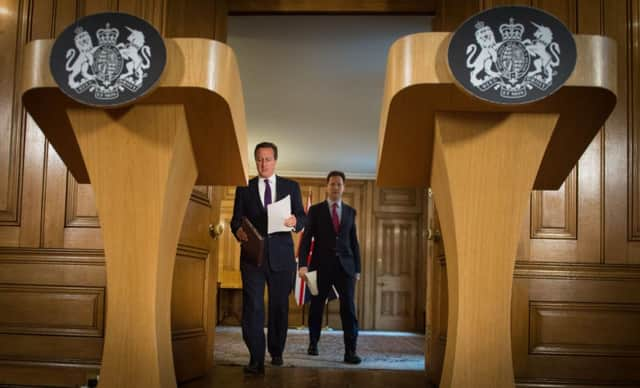Leaders: Move to fight terror stops short of snooping


So when emergency powers are introduced enabling police and security services to access phone and internet records there is bound to be concern. When the legislation is to be rushed through Parliament within a week, such apprehension is inevitable.
Prime Minister David Cameron insists that urgent action is needed to protect the public from “criminals and terrorists”. But the critics have a fair point. For it was in April – three months ago – that the European Court of Justice struck down an EU directive requiring phone and internet companies to retain communications data on the grounds that it infringed human rights. Why the sudden rush to legislation now? Emergency legislation is needed, the government argues, because service providers were being threatened with legal action by campaigners if they did not start destroying data that could prove vital to criminal investigations and court cases.
Advertisement
Hide AdAdvertisement
Hide AdYet, however pressing the need, Parliament has effectively been given just one day to discuss a measure that could potentially open the door for state snooping. But however principled the objections, critics need to acknowledge the uncomfortable fact that we now live in notably more dangerous times.
Both the numbers of recruits to terrorist groups and the sophistication of terrorist equipment and communications have grown exponentially. A government that fails to respond to such step changes in extremist threats and the ability of terrorist groups to strike at will against civilian populations and property would immediately stand accused of failing to protect its citizens.
There are two other important considerations. First, the proposed new powers are not new. The legislation would simply take us back to where we were before the EU ruling. The data that companies will be asked to retain includes details of when calls were made, what numbers were dialled, and other information that can be used in investigations. It does not include the content of the communications.
And second, there are significant constraints on the new legislation. There will be a new Privacy and Civil Liberties Oversight Board to scrutinise the impact of the law on privacy and civil liberties. There will be annual government transparency reports on how these powers are used, a restriction on the number of public bodies, including Royal Mail, able to ask for communications data, and, crucially, a “sunset” or termination clause ensuring these powers expire at the end of 2016.
So while the speed of such legislation is unnerving, the increase in the terrorist threats that we face makes a compelling case to allow these laws which are not really any further towards a snooping state than we were in April.
An error that must not be repeated
A scathing report by MPs on the business select committee about the Royal Mail sell-off had every right to be highly critical of the way this privatisation was handled and in particular the mis-pricing of the company. This resulted in shares soaring far above the initial offer price and a £1 billion loss to taxpayers. The government can ill afford to be cavalier about such an error, especially when it is preaching the need for continuing constraints on public spending.
It is well-nigh impossible for such issues to be priced exactly. Market conditions in the final days can affect demand. And it is true that the offer of shares in Royal Mail was beset with considerable doubts, not least trade union opposition and the impact of industrial action on group revenues. Nevertheless, it is not good enough for the Business Secretary Vince Cable to assert that the price needed to be low for the shares to be bought.
This sell-off exposed glaring shortcomings in the privatisation process. Lazard, the investment bank advising the government, together with global co-ordinators UBS and Goldman Sachs, failed to gauge demand at higher price levels and did not give appropriate consideration to maximising value for money for the taxpayer. When the shares, offered at 330p, shot to as high as 618p, clearly there were major errors in pricing. Not least of these was in the low valuation of Royal Mail properties.
Advertisement
Hide AdAdvertisement
Hide AdAlternatives to the Initial Public Offering process, which would more accurately gauge investor demand, are now being considered by a team of experts chaired by Lord Myners. These should be given every consideration. Future sell-offs must not repeat this lamentable Royal Mail error.